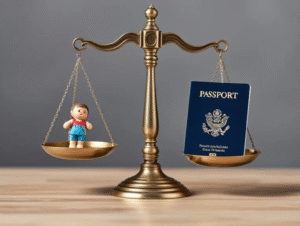Worried your former partner might take your child overseas without consent? Here is a detailed guide on powerful UK court remedies, passport controls, and legal tools that prevent abduction before it happens.
If you’re concerned your former partner might take your child abroad without your permission, you’re not alone. International child abduction is a growing issue in the UK, especially in cases involving child custody disputes after separation or divorce. At AA Grewal & Aggarwal Solicitors, we specialise in providing urgent legal help for child abduction, helping parents take swift action using the full power of UK family court child travel laws.
Table of Contents
Understanding the Risk: Can It Happen to You?
Yes. Parental child abduction typically involves a parent removing a child from the UK without the other parent’s legal consent—often during or after custody disagreements, unresolved immigration issues, or high-conflict separations. If you’re wondering what to do if my ex takes my child abroad without permission, it’s vital to act before abduction occurs.
Under the Children Act 1989 and the Child Abduction Act 1984, UK courts are empowered to take emergency family court orders to prevent unauthorised international travel with a child.
How to Prevent Child Abduction in the UK
The most effective solution is prevention. Here are the key legal remedies available to UK parents:
Prohibited Steps Order (PSO)
This is one of the strongest legal tools to prevent child abduction in the UK. A Prohibited Steps Order prevents a parent from taking specific actions, such as removing a child from the UK, without the explicit consent of the other parent or the court. Issued by the family court, a PSO is legally binding and enforceable.
UK Passport Controls for Children
If there is a real concern about international abduction, the court can order the surrender of the child’s passport. This passport may be held by the solicitor, the court, or the parent with primary custody. This blocks travel unless legally authorised and can be accompanied by UK border alerts for child abduction, allowing the Border Force and immigration authorities to intervene if an unauthorised departure is attempted.
Border Notifications and Alerts
You can formally notify the UK Border Force of a possible abduction risk. Alerts can be placed on your child’s records, and authorities can stop the child at airports or seaports.
Legal Action If Your Child Is Taken Abroad
If your child is already taken out of the country, UK courts may still assist through several international and domestic legal mechanisms.
Wardship Proceedings UK
The High Court can initiate wardship proceedings, placing your child under the court’s direct protection. This can result in enforceable orders to support the child’s safe return or halt further risks.
Hague Convention Child Abduction Remedies
The Hague Convention on the Civil Aspects of International Child Abduction provides a framework for the return of abducted children to the UK—if the destination country is a signatory. Our family law experts can guide you on how to use the Hague Convention in UK child cases and help prepare your case for swift international legal cooperation.
Non-Hague Countries & Diplomatic Channels
If your child is taken to a country not covered by the Hague Convention, there are still options. The Foreign, Commonwealth & Development Office can assist with diplomatic outreach, and we can coordinate legal action against international parental abduction in the foreign jurisdiction.

These preventive steps are not only legally enforceable but can provide peace of mind to a parent who fears the possibility of sudden and unauthorised international removal.
Resolving Disputes Through the UK Family Court
UK family courts can issue a range of orders tailored to protect your child:
- Specific Issue Order UK – clarifies decisions around a child’s education, travel, religion, or other important matters.
- Non-molestation orders & Restraining Orders – applied in cases involving domestic abuse or coercion, to provide legal protection for the left-behind parent and the child.
These family court orders UK are designed to prioritise the child’s welfare while enforcing parental rights.
Where abduction is linked to domestic abuse, coercion, or ongoing threats, the court can also grant protective measures such as non-molestation or restraining orders. These provide a legal safeguard for both the child and the left-behind parent, reinforcing safety and compliance with the law.
Even when the Hague Convention cannot be applied—typically because the child is taken to a country that is not a signatory—there are still viable legal options. Diplomatic engagement, through the UK’s Foreign, Commonwealth & Development Office, and carefully negotiated legal proceedings in the foreign jurisdiction can lead to court-ordered custody enforcement or mediated agreements for the child’s return.
Contact AA Grewal & Aggarwal Solicitors for Immediate Help
If you’re facing the threat of international child abduction, or dealing with cross-border custody disputes, our experienced family law solicitors UK are ready to act fast. We offer expert guidance, emergency legal solutions, and dedicated representation to protect what matters most—your child.
📞 Contact us today for a confidential consultation.
Frequently Asked Questions (FAQs)
Q1: Can I stop my partner taking our child out of the UK?
Yes. You can apply for a Prohibited Steps Order or a Specific Issue Order to restrict or control travel abroad.
Q2: How to report the risk of child abduction in the UK?
Contact your solicitor immediately. They can assist you in notifying the UK Border Force and applying for urgent emergency family court orders.
Q3: What if I gave informal consent in the past but changed my mind?
If the consent was not legally documented, you may still have a case—especially if no return date was agreed or if conditions have changed.
Q4: What happens if my child is already abroad?
Legal options vary based on the country. If it’s a Hague Convention signatory, we can act quickly to initiate a return request. If not, we may pursue diplomatic or foreign legal action.









